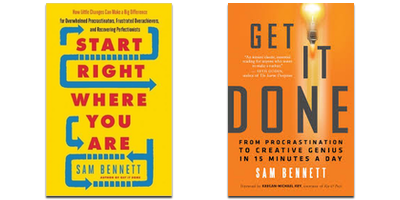
Exercise:
1. Write down all the activities that you typically do in a day, such as:
drive in the car pool
do laundry
pay bills
make phone calls
write
work out
get the mail
read
work with clients
play with the kids
plan upcoming travel
coordinate volunteers for charity event
go to the grocery store
cook supper
watch TV
2. Now put an asterisk next to the tasks that only you can do.
So the asterisked items might be:
write
work out
read
work with clients
play with the kids
3. Find a way to get the un-starred items off your plate.
You may need to hire someone, or you may need to simply ask some of the other grown-ups in your life for help.
Teach the kids to do the laundry, and get a co-chair to work with the volunteers.
Yes, you will have to get over some of your perfectionism — nobody else is going to do as good a job cooking dinner or sorting the laundry as you do.
But guess what? You have bigger fish to fry.
Your creative life is never going to take precedence over your everyday life unless you make it happen.

Ode To The Drama Teacher
And as you stand there: Aghast
Because we’re three days from Opening Night and
Ado Annie still doesn’t know her lines and
The Dream Ballet is a Nightmare and
The Light Board Op just got Detention…
Let us now praise You.
You, the Permanently Fatigued.
You, the Loyal-to-the-Point-of-Self-Neglect.
You, the Keeper of a Thousand-and-Eleventeen Secret Dreams.
You are the one who makes it all Look So Easy.
Who would have expected that the most important Skill you learned getting your BA
Was Juggling?
Juggling Paperwork and Personalities and oh, right – weren’t you supposed to have a
Private Life around here somewhere?
But even though you are Sick to Death of
Spoon River Anthology
You still puddle up every time you hear
There’s A Place For Us
No matter how Off-Key.
And while you still remember when you
Brought the House Down in
Midsummer
You now love This House.
You have created a House where any child – no matter how Flamboyant, no matter how Shy –
Can embrace their Inner Ethel Merman (and thanks to those English 101 classes you now must teach, you are keenly aware that using “their” in the previous sentence is increasingly considered correct and honestly, it’s really the only sensible answer as writing “his or her” is as damaging to poetry as the participle that dangles.)
And you have created a House where any child – no matter how Flamboyant, no matter how Shy – can dive straight to the Deepest, Darkest, Quietest corner of human suffering and bring a room of teenagers – and yes, you, too – to silent tears.
You have made a Home for the Misunderstood
A Family for the Misfit and a
Safe Spot to land no matter how bad The Mid-Terms are.
Because despite all the Budget Cuts and The Paperwork and
The Meetings about the Meeting to Schedule the Meetings and
The Truancies and The Parents
Dear God The Parents and
Did we mention The Paperwork?
Nothing on this Green Earth compares to watching a group of kids
Learn the true meaning of Ensemble.
And nothing compares to the pure joy of watching The Ones whom you knew would Eventually Get It
Finally. Really. Get It.
And nothing nothing nothing compares to The Confidences shared in low tones as they seek you out in
Your Office,
The Choir Room
The Front Seat of the Van on the way home from Fullerton.
You aren’t teaching Drama.
You are teaching Life
Which we all know is a Comedy – a Chekhovian Comedy – but a Comedy nonetheless.
And you aren’t teaching Choreography
You are teaching them to Dance.
And you aren’t teaching them how to be a Character.
You are teaching them how to be Themselves.
So here’s to you –
Making room for Art in a world that seems to have no room for Art.
(Because, by the way, that room has been re-purposed as the new Standardized Test Prep Center – you don’t mind rehearsing outside, do you?)
And here’s to you –
Scrounging around for new shows that somehow match the sets you already have
Because some Genius on the School Board has
Recently Announced that not only can you not perform Huckleberry Finn
Or Anouilh’s Antigone (probably because he couldn’t pronounce it) and
Given the flap over theScene from M. Butterfly last year, I guess
March of the Falsettos and The Vagina Monologues are
Out of the Question for the Spring
So Oh Dear God it looks like it’s going to be
Arsenic And Old Lace one more blessed time.
But that’s OK
I love Arsenic And Old Lace.
So here’s to you –
Making room for Another Coffee Mug with
Those Damn Masks on them
Making room in the Chorus for
Just One More
And
Making room for Each and Every Child
To Be
A
Star.
© 2011 Samantha Bennett
If you would like to share or reprint this poem, I’d be honored. Please be sure to credit me properly by including my full name and website address (© 2011 Samantha Bennett, https://theorganizedartistcompany.com).

Asking yourself the question “Where will I think to look for this?” might be the single greatest organizational step you can take.
Asking yourself this question puts you in a state of awareness about your organizational style and creates an automatic mnemonic so you are even more likely to remember later on.
If I can imagine that the last time I put away a bottle of vanilla extract I thought, “Well, I’ll probably think to look for this with the rest of the baking stuff or maybe with the spices,” and then I put it with the rest of the baking stuff, well, I’ve got a better than fifty fifty chance of finding it right away the next time I need vanilla.
Certainly much higher than if I just jam it on a shelf somewhere where it eventually gets shoved to the back (because it’s a seldom-used item) and where I’ll never find it because I’m not even sure I have any to begin with because I don’t remember the last time I put it away.
This leads to buying more vanilla extract, which, if you use the pure extract (and you really should; the imitation stuff is terrible) is pretty darn expensive.
So why buy two when one, well placed, will do?
Again, the question is not, “Where should this go?” The question is, “Where, given my actual life, would I think something like this might end up?”
This is also a great question to ask yourself in parking garages, although there it sounds more like, “How will I remember which spot this is when I return?”
A good system is practical, realistic, easy, and even fun.
A bad system is impractical, unrealistic, hard, and a bummer.
You, your stuff, your space, and your art all deserve great systems.

And as you stand there
Late again
Because you forgot to allow time to park
And the elevator was slow
And you left 10 minutes late to begin with
With your shoes that pinch
And your pants that are a little too small
Since you started eating white bread again
And as you paw through your bag
Looking for the suite number
That you’re not sure you wrote down to begin with
Let us now praise you.
You, the untidy.
You, the careless.
You, the easily distracted by sparkly things.
The money you spend on late fees alone
Could feed a family in Africa –
Which reminds you that you meant to send in the kids’ Unicef money and
Forgot.
And that despite your best efforts,
You rarely eat a square meal,
You almost never get enough sleep
And exercise seems like a word that magazines have developed
Just to make you feel bad about yourself.
But you are good and brave.
You, flying by the seat of your pants
Making it work
Putting out fires
Saying your prayers
And dancing your dance of now and later and maybe and
I’ll–have-to-call-you-back-on-that-could-you-send-me-an-email-to-remind-me-to-call-you-back-on-that?
As innocent as each morning’s sunrise,
You are a fount of good intentions.
Your good humor is as graceful as a baby giraffe,
Even if that joke you were trying to make to the hotel clerk fell flat
And your toast at the wedding came out sounding a little….funny.
But you have gifts that no one knows about.
You have the strength to bend in the wind
You have the joyful spirit that loves a good belly laugh,
You have the wisdom to understand that everything will all come out all right in the end and
You have the faith to light a candle rather than curse the darkness.
That is, if you could find the book of matches from that romantic restaurant that you went to for your anniversary but since you didn’t have a reservation they made you wait at the bar for half an hour during which you had two appletinis and the rest of the night is a bit of a blur.
So much for the overpriced lingerie.
You are beautiful.
You are beautiful.
Frazzled and overworked and underpaid
You are the one who forgot your wallet
And forgot your receipt for the dry cleaners
And forgot your keys which you just set down five seconds ago, so where could they possibly have gone?
But you never forget to say, “I love you”
And you never forget to give a big smile to that nice parking guy
And you never fail to show endless patience when the
Too-tightly wrapped and overly-conscientious start to offer their Oh-so-helpful suggestions about how you might feel better if you would just learn to alphabetize your spice rack.
You are beautiful.
So, wear the lingerie on Monday for no reason.
And why not just refuse to participate in the bake sale this year?
And give yourself a compliment for something you did well today.
Because you are the most beautiful woman I’ve ever known.

Dear God,
I have made a piece that everyone loves, but God, I don’t think it’s very good.
I know, it’s a weird problem to have.
The thing is, it’s not my best work. I feel uncomfortable being praised for
work I’m not that proud of. It’s hard enough receiving compliments I think I
do deserve, much less ones I know I don’t.
Oh. Wait.
I just remembered that I am not responsible for other people’s experiences
of my work.
I am only responsible for creating and curating my work.
And all of my work is made in praise of You.
So how can that ever be “less than?”
God, help me get over my own snobbishness, ego and false modesty. Help
me to feel the love that others are sharing with me.
Help me work and live always from the center of a joyful, humble heart.
Your heart.
Love,
Me

I’ve never met a single-discipline creative.
Every creative person I know says things like, “Well, I’m a writer. But I also sing in a choir and play bass guitar and drums and embroider and do needlepoint, but I don’t do counted cross-stitch anymore, and of course everyone in my family loves to cook, and did I mention that I also clog dance?”
Like I said, you’re good at a lot of things.
And then there’s the artistry that you bring to your everyday life.
Take a look at the list of creative activities below. This list was created and then added to over the years by hundreds of students and clients. As you’ll see, some of the activities on the list are a bit outside-the-box.
Maybe you, too, have some skills that you never thought of as creative, or dare I say… artistic?
The A-B-C’s of Creative Endeavors
Acro-Yoga, Acting, Acupuncture
ADR (Additional Dialogue
Recording)
Agenda Planning, All Things Mac, Alphabetizing, Animal Husbandry
Animation, Assembling Things, Awesome Salad Making
Baking, Bargain Hunting, Beadwork, Bear Hugging
Big-Picture Thinking, Biking, Bodhran (Irish Drum) Playing
Bomb-Diggity Smoothie Making, Boot Camp Sergeanting
Building Junk, Buying Presents
Cake Decorating, Calculated Risk Taking, Calligraphy
Camerawork, Caregiving, Cartooning
Chameleon-like Ability to Blend In, Choreography
Clothing Design, Coffee Making, Complimenting Others
Creative Listening, Creative Space-Making (for Others’ Art)
Dancing: Ballet, Dancing: Boogie-Oogie-Oogie, Dancing: Modern
Decoupage, Detail Designing (the devil is in the details), Doll Making, Doodling
Dream-Board Making.Driving in Los Angeles, Drumming
Editing, Emoting. Empathizing, Encouraging
Entrepreneurship, Event Planning, Expressing Myself Honestly without Being Cruel
Facebook, Fashionistaing, Faux Painting, Film Critiquing
Filmmaking, Finding Order in Chaos, Fixing Things
Flute Playing, Foley Working, Footwear Design, Furniture Making
Gardening, Gift Wrapping, Going to the Mat, Grant Writing
Graphic Design, Guitar Playing: Electric, Guitar Playing: Folk/Acoustic
Gunsmithing
Handmade Card Making, for Prisoners, Home Cooking, Home Decorating
Honesty about Self (with Wit, Sometimes), Horseback Riding
Idea Formation, Improvising, Information Sharing
Interior Design, Internet Marketing, Invoking
Jewelry Making, Joke Writing, Juggling
Kissing, Kite Making
Life Coaching, Lighting Design, Listening and Giving Advice
Logistics, Long Car Trips, Lovemaking, Lucid Dreaming
Makeup application, Making Others Comfortable with Themselves, Making Fairy Houses Marketing, Massage, Mediating, Mind-Body-Soul Coaching Motivational Speaking, Music Producing:Stage and Studio
Needlework: Crocheting, Needlework: Embroidering, Needlework: Hand Sewing, Needlework: Knitting, Needlework: needlepoint, Networking, Nursing
Ocarina Playing, Organizing Painting
Painting by Number, Party Throwing, Personal Training, Philosophy, Photography, Piano: Rudimentary, Playwriting,
Poetry: Limericks, Poetry of the Obscene,Poetry: Romantic Poetry: Memorizing
Poster making, Producing, Public Speaking
Pulling Business Concepts out of My Butt (a.k.a.Entrepreneurship?)
Quad Riding
Raw Food Juicing, Reading, Reading Aloud, Reading to Oneself, Reciting
Recorder Playing, Recovery (12-Stepping), Rollerblading, Roller-Skating
Sales, Saying No, Scabbard Making, Scenic Design, Scrapbooking, Screenwriting, Script Coverage, Sculpey-Clay Bead-Making, Set Designing,Sewing, Shopping, Show Producing: Multiple Genres, Shrinky-Dink Making, Silk Screening, Singing, Singing: Classical Music, Singing: Gospel, Snowboarding, Soap Making, Social Media, Software Design, Spiritual Leadership, Stand-Up Comedy, Staying in Touch, Studying/Being a Student, Stunt Fighting/Stage Combat Stunts
T-Shirt Design, Talking to Animals, Teaching, Technological Geekery
Theater: Avant-Garde, Theater: Classical, Theater: Clowning,Theater:Directing
Theater: Improvisation, Theater: Industrial/Business, Theater: Mime,Theater: Musical Comedy
Theater: Shakespeare Theater: Sketch Comedy, Throwing Theme Parties, Tomboyishness
Toy Making, Traveling, Tree Hugging, Tweeting
Urban Living
Vegan Baking, Video Blogging, Video Gaming
Exercise: How Many Kinds of Artist Are You?
Take a sheet of paper and divide it into two columns.
In the first column, write down any of the skills or talents from the list above that you possess. Add to the list any additional skills you have mastered that you might think of as an art.
Gift giving? Coffee brewing? Comforting people when they’re upset? Daydreaming?
In the second column, make a note about how that talent might help you to solve a current issue in your life in a unique way.
For example, remembering how good you are at throwing parties might inspire you to make your next boring meeting more festive.
Calling to mind your puzzle-solving genius might suggest a fun, new way to approach your blog.
It drives me crazy when I hear an artist say, “Oh, I could never get a real job because I’m only good at one thing.”
Nonsense.
Spending a lifetime in the arts helps you develop all kinds of valuable skill sets: listening, reading body language, using your keen intuition; a love of history; good rhythm; the ability to present in front of a group; a sense of shape, color, and design; the ability to accept criticism; a knack for collaboration and teamwork (we usually call it “ensemble”); and most of all, the ability to think of a new idea and work hard until it’s done.
I’m not saying that you have to get a real job if you don’t want one.
I just want you to notice how many skills and art forms you bring into every room you grace.
Vocals
Water Skiing
Web Design
Whitewater River Guiding
Woodcut-Print Making
Woodworking
Wrapping Presents
Writing
Writing Love Notes
Writing Meditations
Yoga
YouTube
Once you are done noticing your own unusual art forms, you might want to take a moment to notice someone else’s.
People feel very seen and cared about when you take the time to praise the way they walk in the world.
A heartfelt compliment such as “I notice that you are always very considerate in your remarks when we have
these meetings — thank you for that” can do a lot for a strained work environment.
And I will tell you from experience that writing a kindly, observant thank-you note can win you a friend for life.
Select three of your special talents, and make a note about how these gifts might be useful to you in moving your project forward.
Would love to know what you came up with, leave a comment below if you feel like sharing.








